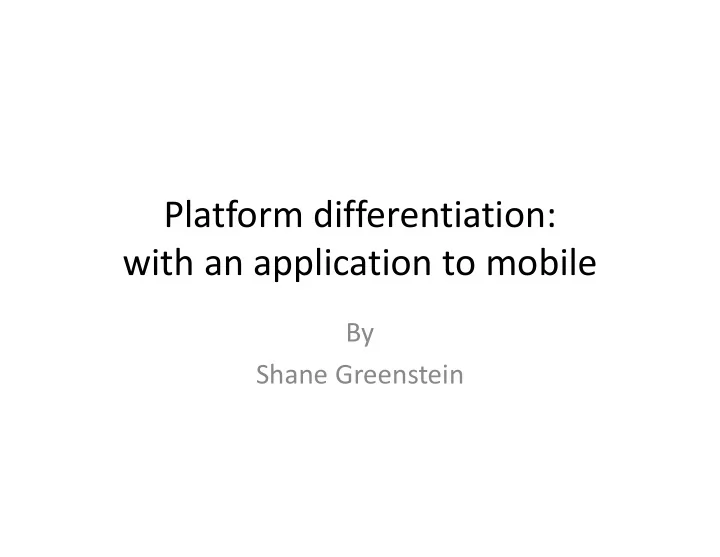

Platform differentiation: with an application to mobile By Shane Greenstein
Thanks • Thanks for the time. • Will try to get a conversation started. – Based on joint work with Tim Bresnahan – Still a bit fuzzy. Appreciate feedback.
The plan • Define terms • Motivation: a general economic question • Why non ‐ hierarchical platforms survive/thrive • In mobile platforms, in particular, parts 1 & 2 • Recap
Define terms for a value chain analysis • Value chain: tracing flow of money. Online ads amount to approx $32B US, less than wireline access rev, approx $40B. – Mobile access/ad rev? Publically quoted numbers are small. • A platform : a reconfigurable base of compatible components on which users and firms build applications. – iPhone, Android, Blackberry, Symbian, MS Windows • Hierarchical platform: centralized control of investment, pro ‐ active management of boundaries. – High fraction of platform owned/controlled by platform leader. • Complements : two or more components that work together when delivering service, e.g., platform & app. • Contracting : Platform leaders make contracts w/developer over access to info, money, requirements; platform leader can partially shapes apps w/quid ‐ pro ‐ quo.
Motivation: a general economic question • Most economists would agree that… – Hierarchical platforms coordinate complements well – Using contracts to govern relations b/w partners usually yields better outcomes than using none. • For a large # of reasons…but big one is “assigning responsibilities reduces negative externalities…” • So…why don’t we always see a dominance of hierarchical platforms that use contracting? – In the market, generally, & in mobility, in particular? • Our answer: markets that enable successive generations of differentiated platforms enable experimentation in platform governance – Particularly less hierarchical platforms, which turn out to have some advantages.
Why non ‐ hierarchical platform (NHP) survives/thrives (perhaps) • Coordination works in short run, but costly & requires planning, which limits range of apps. – Platform leaders will limit costs by investing in designs to support some types of apps, not others. • Aspects where forecast most value, but fixed/irreversible. – Leaders will not design platforms (APIs, SDKs) to encourage direct competitors. • Or encourages cannibalization or loss of control. • Contracting over time challenging. Not all apps cooperate. Hierarchical platforms “lose” some. – Mistrust in sharing information, particular when value ‐ contingent contracts depends on future. Renegotiation. • Differentiation by a follower takes advantage of uncovered gaps by the existing/earlier.
In mobility, in particular, part 1. • Apple differentiated from Blackberry w/different conception about source of value. Technical discontinuities arise from platform governance model. – Keyboard v. touch ‐ typing – Small screen, big color – Minimal bandwidth, allowing high bandwidth – Minimal web, allowing high web presence – Data center v. cloud ‐ based support – Protected email v. data ‐ plan surfing – Deep carrier cooperation v. a degree of tension • Differentiating from Nokia & Windows too. – For sake of time “leave as a homework exercise.”
In mobility in particular, part 2. • As follower, Android differentiated from Apple. • Apple gains from revenue. – Android from ads, search ‐ based. • Apple has approval process, i ‐ tunes compatible, which users value in i ‐ tunes. – Android encourages google maps/search, some freedom in customization. • Apple reserved rights. Pushed costs to developers. Controlled some pricing. – Android invited developers w/more discretion.
Recap • Why did we get a search ‐ oriented ad ‐ based platform in mobile smart phones? – Because hierarchical platforms have short run advantages, but limited over time. If second entrant can differentiate w/non ‐ hierarchical platform governance, it will do if it gets somewhere. – Different way of thinking about boundary of competition. • The good news: mkt today is running a horse race on differentiated approaches to raising revenue in mobile. – The open question: what type of horse race are we observing in wireline ‐ supported Internet? Where are points of differentiation in platforms? Do we have a system where lots of alternatives can experiment?
• Thanks.
Recommend
More recommend